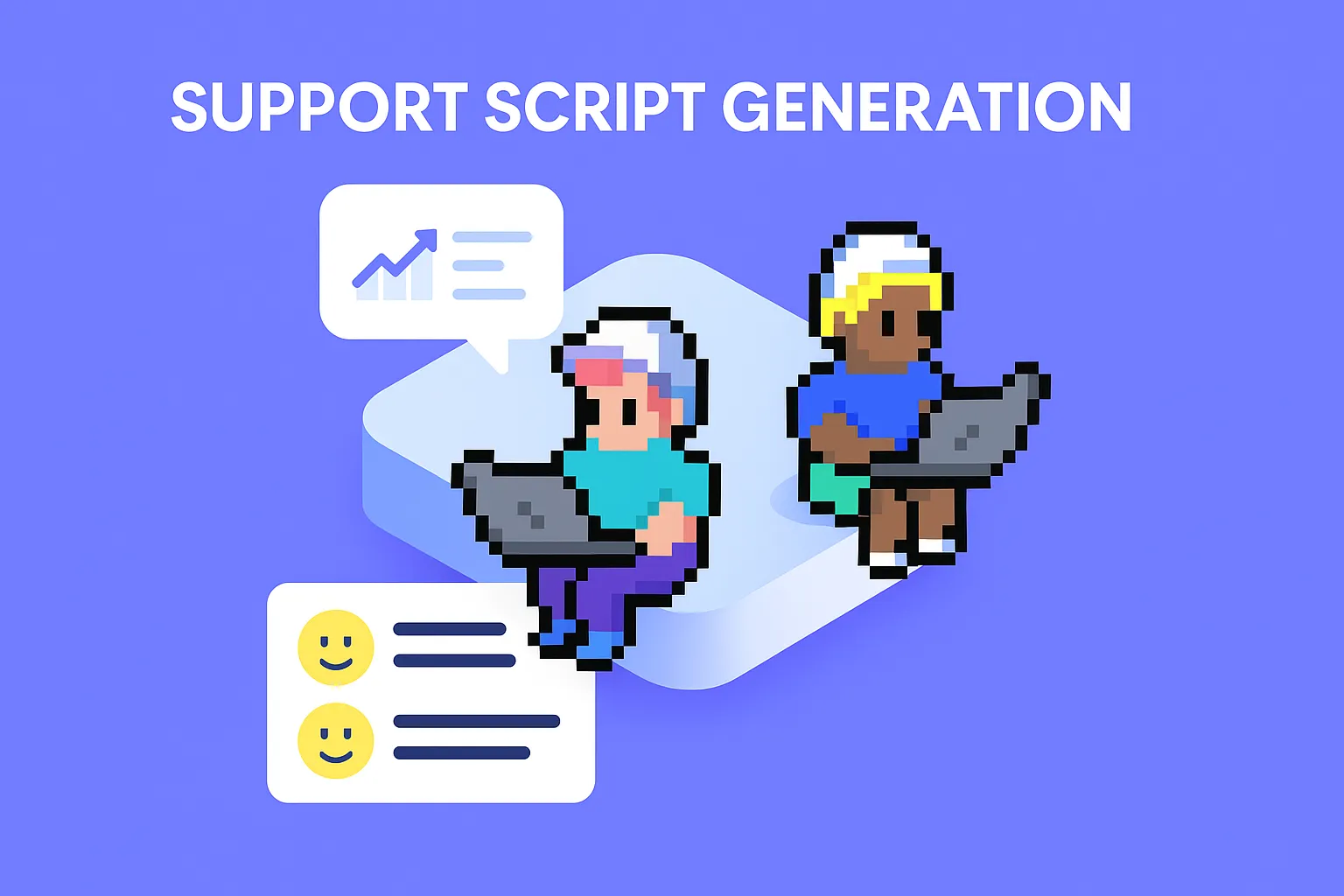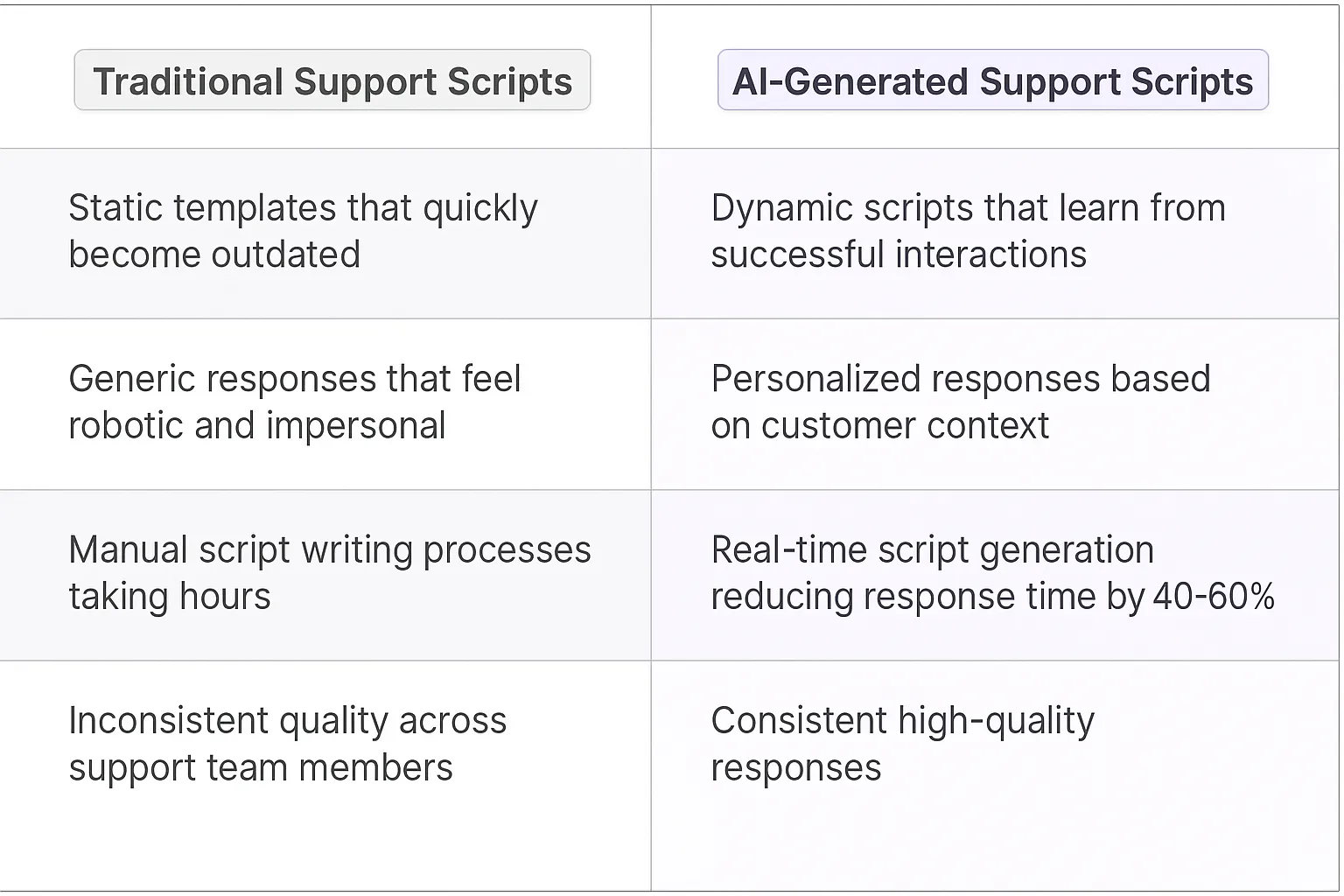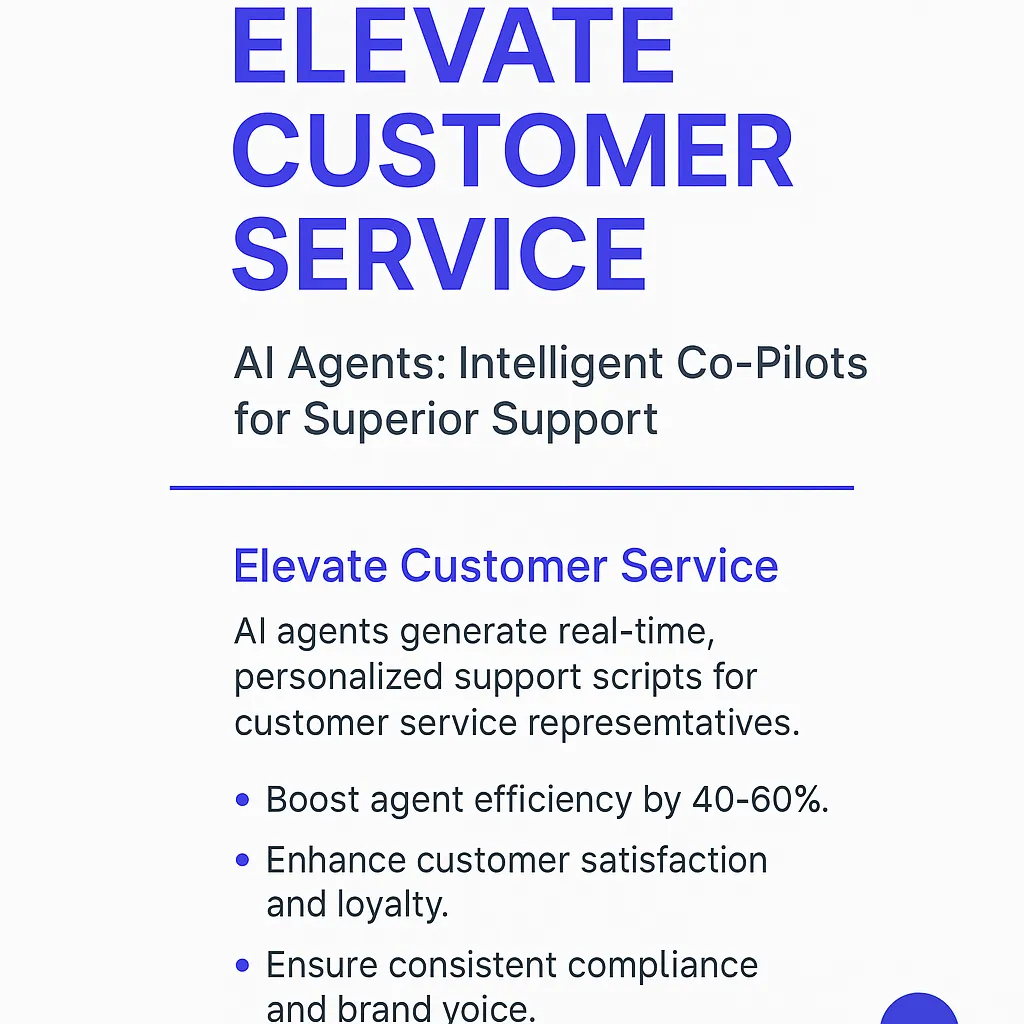Support Script Generation AI Agents
Understanding AI-Powered Support Script Generation
What is Support Script Generation?
Support Script Generation leverages AI technology to dynamically create contextually appropriate customer service responses. Unlike traditional template systems, this technology analyzes vast amounts of successful support interactions, customer data, and company communication guidelines to generate personalized scripts that maintain brand voice while addressing specific customer needs. The system adapts and learns from each interaction, creating an ever-improving knowledge base of effective support communications.
Key Features of Support Script Generation
- Real-time script generation based on customer context and history
- Multi-factor analysis incorporating sentiment, product details, and compliance requirements
- Continuous learning from successful support interactions
- Adaptive tone matching based on customer communication style
- Built-in compliance and brand voice preservation
- Edge case handling capabilities

Benefits of AI Agents for Support Script Generation
What would have been used before AI Agents?
Support teams traditionally relied on static knowledge bases, template libraries, and manual script writing processes. Customer service reps would spend hours copying and pasting from outdated documents, then customizing responses one-by-one. The reality was endless spreadsheets filled with canned responses that quickly became stale and failed to address evolving customer needs. Junior reps especially struggled with tone consistency and proper escalation protocols.
What are the benefits of AI Agents?
The game-changing aspect of AI Agents for support script generation lies in their ability to learn from every interaction. These digital teammates analyze thousands of successful support conversations to understand what actually works - not just what's documented in the playbook.
When generating scripts, AI Agents consider multiple contextual factors simultaneously:- Customer sentiment and tone- Previous interaction history- Product-specific details- Company voice guidelines- Regulatory compliance requirements
The network effects are particularly fascinating here. Each new support interaction makes the AI Agent smarter, leading to continuously improving script recommendations. We're seeing support teams reduce response time by 40-60% while maintaining higher CSAT scores.
But the real unlock is how AI Agents handle edge cases. Rather than forcing reps to MacGyver together responses from rigid templates, AI Agents can generate contextually appropriate scripts even for unique situations. They're essentially turning every support rep into a senior-level communicator by providing situationally-aware response frameworks.
For growing support teams, this means new hires can ramp up faster and deliver consistent quality from day one. The AI becomes a real-time coach, suggesting improvements to tone and language while ensuring compliance with support protocols.

Potential Use Cases of Support Script Generation AI Agents
Processes
- Converting complex technical documentation into clear, conversational support scripts that feel natural and empathetic
- Analyzing past successful customer interactions to create data-driven script templates that actually work
- Developing multilingual support scripts that maintain consistent brand voice and technical accuracy across languages
- Building dynamic decision trees that help support teams navigate complex troubleshooting scenarios
- Creating personalized response templates based on customer segments and historical interaction data
Tasks
- Generating step-by-step troubleshooting guides for specific product features or common issues
- Writing empathetic responses for sensitive situations like billing disputes or service outages
- Crafting follow-up templates that encourage customer feedback and maintain engagement
- Developing scripts for proactive customer outreach during product updates or service changes
- Creating quick-response templates for social media support channels
- Building FAQ responses that balance technical accuracy with readability
The Growth Loop of AI-Powered Support Scripts
Support script generation represents a fascinating intersection of machine learning and customer psychology. The most compelling aspect isn't just the automation - it's the continuous learning loop that develops. When support teams deploy AI-generated scripts, they're not just saving time; they're creating a data flywheel that gets smarter with each interaction.
The network effects here are particularly interesting. Each successful customer interaction feeds back into the system, refining future scripts and creating increasingly personalized responses. This isn't just about scale - it's about building a knowledge base that evolves with your customer needs.
What makes this truly powerful is the ability to identify and replicate successful conversation patterns across an entire support organization. The best support scripts aren't just technically accurate - they capture the subtle emotional intelligence that turns frustrated customers into loyal advocates.
For growing companies, this capability becomes a critical growth lever. When you can consistently deliver high-quality support interactions across channels and languages, you remove one of the key friction points in scaling customer service operations.

Industry Use Cases
Support script generation through AI agents represents one of those profound shifts that fundamentally changes how teams operate. The technology acts as a force multiplier - taking the heavy lifting out of creating customer service responses while maintaining that crucial human element.
What makes this particularly fascinating is how AI agents adapt their script generation across different business contexts. They learn from existing support conversations, documentation, and team knowledge to craft responses that feel authentic rather than robotic. This isn't just about automating responses - it's about elevating the entire support experience through contextually aware, intelligent scripting.
The real power emerges when we look at specific industries putting this capability to work. From SaaS companies handling technical queries to retail brands managing high-volume customer care, AI agents are becoming integral members of support teams. They're not replacing human agents, but rather amplifying their capabilities by handling the heavy lifting of script creation and optimization.
Let's explore how different sectors are leveraging AI agents for support script generation in ways that directly impact their bottom line while enhancing customer satisfaction.
E-commerce Support Script Generation: Converting Customer Pain Points into Sales Opportunities
When I advise e-commerce startups, one of the most overlooked growth levers is support script optimization. Support teams often stick to rigid templates that feel robotic and miss crucial opportunities to build customer relationships. This is where Support Script Generation AI Agents create massive value.
Take the case of a mid-sized fashion retailer I worked with. Their support team was handling 2,000+ inquiries daily about sizing, returns, and order tracking. The traditional approach involved generic responses pulled from a static playbook. The results? A mediocre 65% customer satisfaction score and minimal cross-sell success.
By implementing a Support Script Generation AI Agent, they transformed these interactions into personalized conversations. The AI analyzes past successful support interactions, customer purchase history, and real-time sentiment to generate contextually relevant scripts. For example, when a customer inquires about returning a dress that doesn't fit, the AI crafts a response that not only handles the return professionally but also suggests alternative styles based on their browsing history and previous purchases.
The numbers tell the story: Customer satisfaction jumped to 82% within three months. More importantly, 23% of support interactions now lead to additional purchases. The key insight here is that support conversations aren't just about problem-solving - they're untapped sales channels waiting to be optimized.
What makes this particularly powerful is the AI's ability to learn and adapt in real-time. As customer service reps use the generated scripts, the system tracks which variations perform best and continuously refines its suggestions. It's like having a support manager who never sleeps, constantly analyzing and improving every customer interaction.
Healthcare Support Script Generation: Transforming Patient Communication in Medical Practices
During my recent deep dive into healthcare tech adoption, I discovered something fascinating about medical practices struggling with patient communication. Most clinics rely on outdated phone scripts that fail to address the emotional nuances of healthcare interactions. The opportunity cost of poor communication in healthcare is massive - it directly impacts patient outcomes and practice revenue.
A multi-location dental practice I advised faced this exact challenge. Their front desk staff handled 500+ daily calls covering appointment scheduling, treatment questions, and insurance inquiries. The standard scripts they used were clinical and cold, leading to a 45% appointment no-show rate and low treatment plan acceptance.
Implementing a Support Script Generation AI Agent reshaped their patient communication strategy. The AI analyzes successful patient interactions, treatment histories, and demographic data to generate empathetic, personalized scripts. When a patient calls about wisdom tooth extraction concerns, the AI creates a response incorporating their specific insurance coverage, previous dental anxiety notes, and relevant post-care instructions.
The transformation was significant: No-show rates dropped to 28% in the first quarter. Treatment plan acceptance increased by 35%. But the most compelling metric wasn't numerical - it was the shift in patient feedback. People started mentioning how "understood" they felt during phone interactions.
The AI's learning loop is particularly powerful in healthcare because it captures subtle communication patterns that work best for different patient segments. For example, it learned that elderly patients respond better to detailed, step-by-step explanations, while younger patients prefer concise information with digital resource links. Each interaction makes the system smarter, creating a constantly evolving playbook of effective healthcare communication.
This growth loop reminds me of early social networks - the more interactions that occur, the more valuable and refined the system becomes. It's a classic network effect applied to healthcare communication optimization.
Considerations When Building Support Script AI Agents
Building effective support script generation requires careful navigation of several critical factors that directly impact both agent performance and user adoption. The complexity goes far beyond simple template matching.
Technical Challenges
Training data quality makes or breaks script generation capabilities. Support conversations contain nuanced human interactions that AI models struggle to fully grasp. The model needs exposure to thousands of real support conversations showing proper tone, empathy, and problem-solving approaches.
Context awareness remains a major hurdle. The AI needs to understand product-specific details, customer history, and previous interactions to generate relevant scripts. Without this context, responses can feel generic or misaligned with the customer's actual situation.
Operational Challenges
Support teams often resist fully automated script generation, viewing it as a threat rather than a tool. The key is positioning the AI as an enhancer of human capabilities - suggesting responses while leaving final control with support staff.
Script consistency across channels requires careful calibration. Customers interact through email, chat, phone, and social media - each demanding different communication styles. The AI must adapt tone and format while maintaining brand voice.
Implementation Best Practices
Start with a focused scope covering common support scenarios. This allows teams to build confidence in the AI's capabilities before expanding to more complex cases. Create clear feedback loops where support staff can flag problematic scripts and suggest improvements.
Build guardrails preventing inappropriate responses. This includes content filters, sentiment analysis, and escalation triggers for sensitive situations requiring human judgment. Regular audits help catch edge cases where scripts may need refinement.
Measuring Success
Track both quantitative and qualitative metrics. Response time and ticket resolution rates provide hard data, while customer satisfaction scores and support team feedback reveal the real-world impact. Monitor script adoption rates to identify areas where the AI needs improvement.
The goal isn't replacing human support - it's amplifying their capabilities. When implemented thoughtfully, script generation AI becomes a powerful tool for delivering consistent, high-quality customer support at scale.
Transforming Customer Service Through AI-Powered Evolution
The adoption of AI Agents for support script generation marks a fundamental shift in how companies approach customer service. The technology's ability to learn, adapt, and generate contextually appropriate responses creates a powerful growth loop that benefits both customers and support teams. As these systems continue to evolve, they're not just improving efficiency metrics - they're transforming support roles into strategic customer relationship builders. The most exciting aspect isn't the automation itself, but the continuous improvement cycle that develops, making every interaction contribute to better future customer experiences.













